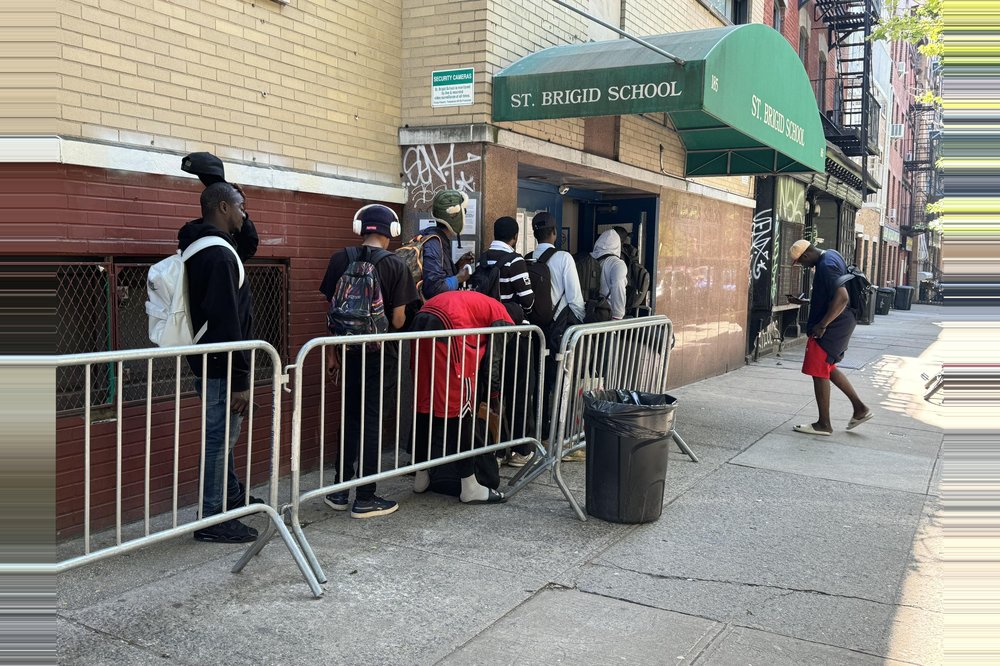NYC’s tough new shelter rules for migrants kick in. The impacts remain to be seen.
May 22, 2024, 5:49 p.m.
Wednesday was the first day that adult migrants at the end of their stay limits could be evicted from city shelters, with some exceptions.

Migrants lugging suitcases and backpacks stood in line outside a city reticketing center in the East Village on Wednesday morning, waiting to reapply for shelter beds as new, stricter limitations on migrant shelter stays took effect.
Some brought documents they hoped would help make their case to remain housed.
“I have to stay here until I can get a work permit, and then look for a lease so I can rent whatever small thing is out there,” said Belkis Garnier de Moreno, a 61-year-old from Venezuela.
Wednesday marked the first time that adult migrants who have reached the end of their 30- or 60-day stay limits could be legally evicted from New York City shelters, with limited opportunities to stay. About 30 migrants had shelter stays that were due to expire under the new rules, according to Kayla Mamelak, a spokesperson for Mayor Eric Adams.
His administration released no immediate accounting of how many migrants were actually removed on the first day of the policy, which will be rolled out to thousands of other new arrivals in the coming weeks. Still, the policy represents a new heavy-handed era in the city’s migrant response, as the Adams administration intensifies its efforts to get migrants to leave the strained shelter system.
Roughly 200,000 migrants have come through the city’s intake center since an influx began two years ago, and about 130,000 of them have left the city's care, according to officials. The new rules heighten the stakes by forcing migrants out of shelter based on the city’s timeline — whether they are prepared to exit or not — unless they can show they face “extenuating circumstances.”
Immigration and housing advocates have expressed concerns that the new rules will allow the city to unfairly evict migrants who lack other places to stay. But the immediate impact of the policy change was difficult to discern on Wednesday as migrants came and went from some of the more than 200 shelter sites across the city.
As of Sunday, more than 9,000 migrants had received 30- or 60-day notices under the new rules, Mamelak said. She added that as of Tuesday, more than 190 migrants had applied for extensions, and 118 of them were approved while the rest were denied. Migrants who were denied extensions can still reapply until their final 30- or 60-day deadline. All new migrants seeking shelter will be subject to the new rules come Monday, according to city officials.
The Adams administration has for months limited migrants' shelter stays to 30 or 60 days, depending on their age and family composition, with the option to reapply if they have nowhere else to go. Migrants hoping to stay longer can receive an extension if they can demonstrate extenuating circumstances, in accordance with a recent court settlement that modified the city's long-standing right-to-shelter policy.
Those migrants are required to prove they have made "significant efforts" to leave shelter, such as by applying for asylum, looking for a job or engaging in a range of other activities. Some have scrambled to document their efforts with the assistance of attorneys and aid workers. City officials have maintained that the decisions will be made on a case-by-case basis.
Josh Goldfein, an attorney for the nonprofit Legal Aid Society who has been monitoring the city's compliance with the settlement, said he knew of at least one individual who was denied an extension after he had secured a full-time job, began looking for an apartment and took English and job training classes.
“Our concern is they are not going to give people sufficient credit for the efforts that they've made, or that the process doesn't elicit that information from people, so that they are denying people who had done what they needed to do,” said Goldfein.
Lennys Gonzalez, a 50-year-old Venezuelan migrant waiting outside the East Village reticketing center on Wednesday, said she supported the new rules. “Many people are living off the state,” she said.
While Gonzalez said was not yet subject to the new policy, she thought she would qualify for an extension because she has tried to get a work permit and take English classes. "I can’t stay in the street,” she added.
NYC isn't fulfilling promises to migrant families facing shelter eviction, report says Migrants and advocates brace for stricter rules in NYC shelters as evictions loom Migrants still await NYC shelter beds a week after a backlog should have been cleared Where did the migrants who left NYC’s shelter system go?